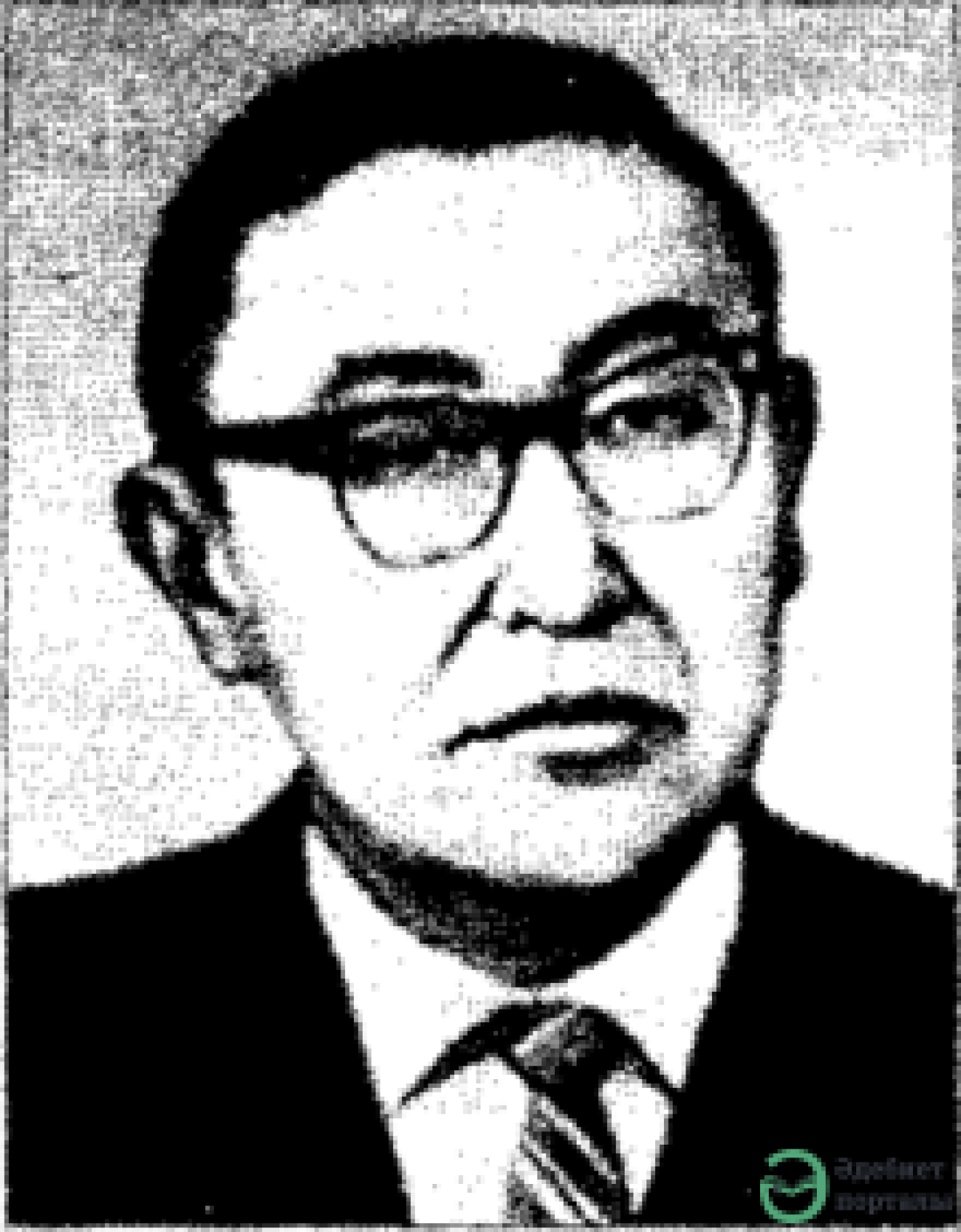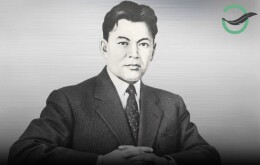On September 24, Kazakhstan quietly marks the birth anniversary of Khasen Ozdenbayev – a name that deserves far more resonance than it has. Ozdenbayev (1904–1992) was a prolific writer and translator who poured his life into enriching Kazakh literature, yet he remains underrecognized outside of specialist circles. His story is one of talent and dedication: a man who survived political repression to become a bridge between Kazakh readers and world literature. Despite extensive contributions – from original satirical essays to masterful translations of Russian, European, and Central Asian classics – Ozdenbayev has never been widely celebrated. This profile introduces his life and work, illuminating why this gifted literary figure merits greater recognition.
Early Life and Education
Born on September 24, 1904 in a small village of Kostanay region (then the Russian Empire), Khasen Vakhitovich Ozdenbayev grew up on the Kazakh steppe. He received a rich, multicultural education. As a boy he studied at a Russo-Tatar school attached to a Tatar medrese (religious academy) in Troitsk, and later attended a Russian gymnasium (secular secondary school). This dual exposure to Islamic scholarship and Russian classical learning gave him a strong linguistic foundation. Ozdenbayev went on to train as a teacher in Orenburg and even took specialized courses in Moscow to prepare as a newspaper editor. By the mid-1920s, armed with education and fluency in multiple languages, he was ready to embark on a literary career.
Ozdenbayev initially worked in Soviet public service – including roles in legal and administrative organs – but his passion was for writing. In 1928, he transitioned fully into journalism, a field in which he would spend the rest of his working life. His earliest published pieces were feuilletons (satirical vignettes) and essays, printed in the Aul newspaper in Kostanay. These witty sketches of village life and social issues marked the debut of a keen literary voice.
A Turbulent Career in Journalism
By the 1930s, Khasen Ozdenbayev had risen through the ranks of Kazakhstan’s nascent literary and media scene. In the spring of 1937, he was appointed editor of a regional Kazakh-language newspaper in East Kazakhstan (the daily Ekpindi, meaning “Energetic”). It was a significant responsibility for a man in his early 30s, reflecting his standing as an emerging intellectual leader. However, these were also the years of Stalin’s Great Purge – a perilous time for anyone with a public voice. Ozdenbayev’s promising career nearly shattered when he became a victim of political repression. In 1938, amidst an atmosphere of paranoia, he was accused of being an “enemy of the people,” expelled from the Communist Party, and arrested on charges of counterrevolutionary activity. His downfall was shockingly swift: within a year of his editorial appointment, he was sent to a labor camp.
Ozdenbayev spent roughly three years (August 1938 to June 1941) in imprisonment, an experience that could have silenced him forever . The allegations were baseless – likely the result of a minor “political carelessness” or editorial decision that hardliners seized upon. In later recollections, colleagues noted that many Kazakh intellectuals of that era were purged under false pretenses. Ozdenbayev was no exception, joining the tragic ranks of writers punished during Stalin’s terror. Fortunately, his story did not end in a prison camp. As World War II engulfed the Soviet Union, he was released and eventually exonerated. Formal rehabilitation came in 1955 during Khrushchev’s de-Stalinization thaw , but Ozdenbayev had actually returned to useful work years earlier. Remarkably, he picked up the pieces of his career and resumed doing what he did best – writing and translating.
After the war, Ozdenbayev joined the Kazakh Telegraph Agency, known as KazTAG (the forerunner of today’s Kazinform news agency). There, he found a long-term professional home. He served for decades as chief editor of the translation department at KazTAG, translating news and literature and mentoring younger translators. Surviving the Stalinist purge had instilled in Ozdenbayev a cautious loyalty; he was a Communist Party member and a model Soviet employee once rehabilitated. But beyond the bureaucratic role, his true legacy at KazTAG was as a cultural mediator – ensuring that important writings flowed between Kazakh and Russian languages in the republic. In a 2020 interview marking Kazinform’s centenary, agency veterans hailed Ozdenbayev as “one of the first and most talented translators,” noting that he, like some founders of the agency, had endured repression yet returned to contribute immensely to Kazakhstan’s media and literature.
Literary and translation works
While Khasen Ozdenbayev’s formal job titles centered on journalism and editing, his creative output was substantial. In Kazakh literary circles he was known not only as a journalist but as a writer of feuilletons and sketches – concise pieces that often satirized bureaucracy, championed social progress, or simply painted vignettes of everyday Kazakh life. Though he did not produce large novels or plays, his newspaper writings in the 1920s–30s were admired for their clarity, humor, and engagement with current issues.
However, Ozdenbayev’s towering contribution was in the field of literary translation. He devoted most of his career to translating important works of Russian and world literature into the Kazakh language – and, in a few cases, translating Kazakh literary works into Russian. During the mid-20th century, as Kazakhstan’s literary culture developed, Ozdenbayev was a central figure ensuring Kazakh readers could access global classics in their own tongue. Among the many works he rendered into Kazakh were:
• Mikhail Sholokhov’s novels Virgin Soil Upturned and The Quiet Don – epic tales of Soviet upheaval and Cossack life. Ozdenbayev translated Virgin Soil Upturned in two volumes (published 1951 and 1965) and even translated the second volume of The Quiet Don (1956), tackling Sholokhov’s rich, idiomatic Russian and making it accessible to Kazakh readers . He also translated Sholokhov’s famous short story The Fate of a Man, a searing wartime tale .
• Ivan Goncharov’s novels Oblomov and An Ordinary Story – classics of 19th-century Russian literature. Oblomov (translated in 1954) introduced Kazakh audiences to Goncharov’s indolent hero as a cultural archetype, while An Ordinary Story (1958) conveyed the nuances of a young man’s disillusionment in Petersburg.
• Honoré de Balzac’s Shagreen Leather – a French novel of fantasy and greed, which Ozdenbayev translated into Kazakh in 1954. Bringing Balzac’s ornate prose to Turkic readers was no small feat, and this translation expanded the horizons of Kazakh readers with European classics.
• Works by Prosper Mérimée and Ivan Vazov – Ozdenbayev translated short stories by Mérimée (a French writer) and Vazov (a Bulgarian author) in the 1950s. These included, for example, Mérimée’s dramatic tales and likely Vazov’s patriotic stories, further enriching Kazakh literature with diverse voices.
In addition to translations into Kazakh, Ozdenbayev also worked in the opposite direction. Notably, he co-translated Gabiden Mustafin’s Kazakh novel Dauıldan Keıın (After the Storm) into Russian, alongside N. Kuzmin. This novel, published in Russian in 1961 and 1963, gave broader Soviet readership access to a Kazakh literary work. He similarly translated Uzbek and Tatar literature: for instance, the Uzbek writer Asqad Mukhtar’s novel Apaly-Siŋliler (Sisters) and Tatar writer A. Eniki’s poignant story “Aiytlmay qalğan ösiет” (“The Unspoken Testament”) into Russian. Through such projects, Ozdenbayev helped share Central Asian literature with other Soviet peoples.
Ozdenbayev’s range even extended to translating film scripts. His pen was behind the Kazakh translations of the screenplay “Don Stories” (based on Sholokhov’s Don tales) and “Lenin in Poland,” a film by E. Gabrilovich. These efforts underscore his versatility – he could handle historical epics, psychological novels, folk tales, and even cinematic dialogue. Across all these works, Ozdenbayev’s translations were known for their accuracy and fluency, preserving the author’s intent while using elegant, accessible Kazakh prose. In many cases, his were the definitive Kazakh editions of these classics for decades. Generations of Kazakh students and readers first encountered Oblomov’s sloth or the tragedy of The Quiet Don through Ozdenbayev’s words, often unaware that a translator’s skill made the experience possible.
In translation, Ozdenbayev’s “style” was necessarily adaptive – he had to channel the voices of other authors. Nevertheless, one discerns his meticulous care in the terebij (craft) of translation. He was part of the first generation of Kazakh literary translators to truly professionalize the field, and he set high standards. For example, Sholokhov’s sprawling novels required him to invent or repurpose Kazakh vocabulary for Cossack customs and Soviet agricultural terms, which enriched the Kazakh literary lexicon. Literary scholars have noted that Ozdenbayev often collaborated with poets and writers on translations, blending linguistic precision with artistic flair. (One archival note reveals that when translating a seemingly “small” work, two luminaries – poet Gali Ormanov and translator H. Ozdenbayev – both worked together, indicating the importance attached to getting it right). Such collaborations speak to Ozdenbayev’s standing as a “translator’s translator,” trusted to handle seminal texts. His work on The Quiet Don, for instance, was done in stages and he even served as editor-consultant on Kazakh editions of the novel beyond the portions he translated .
Culturally, Ozdenbayev’s contributions were profound. By translating Russian and Western classics into Kazakh, he helped build a bridge between Kazakh readers and world literature. In the mid-20th century, as literacy in Kazakhstan grew, having native-language versions of Tolstoy, Sholokhov, Balzac, or Vazov meant that Kazakh-language education could include those global masterpieces. This not only broadened intellectual horizons but also aided the development of modern Kazakh literary language. Conversely, by translating Kazakh works into Russian, Ozdenbayev gave Kazakh authors a presence on the all-Union stage. His translation of Mustafin’s After the Storm, for example, meant that a novel about Kazakh village life after World War II could be read in Moscow or Leningrad, showcasing Kazakh storytelling to the wider Soviet audience. In essence, Ozdenbayev was a cultural intermediary at a time when Kazakhstan was defining its identity within the USSR – he made sure the voices of others were heard across language barriers.
Legacy and underrecognition
Despite his extensive body of work and the respect he earned among peers, Khasen Ozdenbayev’s legacy has remained relatively quiet. He was officially honored in his lifetime – named a Merited Cultural Worker of the Kazakh SSR, and awarded medals like “Veteran of Labour” and “For Valorous Work” for his contributions. Such accolades acknowledge his service, yet they did not translate into broad public recognition. Unlike famous Kazakh novelists or poets, Ozdenbayev did not become a household name. Several factors help explain why his work has not been widely celebrated.
First, much of Ozdenbayev’s creative energy went into translation, a discipline often described as a “silent art.” Translators operate behind the scenes; readers remember the original authors but rarely the individuals who translated the books. Ozdenbayev’s name appeared in fine print on title pages and in credits, but the spotlight usually shone on writers like Sholokhov or Balzac. His role was vital but unobtrusive, and over time the general public simply enjoyed the works without knowing whom to thank for the Kazakh editions. In Kazakhstan’s literary historiography, original authors and poets have understandably dominated the limelight, leaving gifted translators like Ozdenbayev underappreciated.
Second, Ozdenbayev did not produce a singular “breakthrough” original work that could have cemented his fame. He was a journalist and short-form writer by choice and circumstance. The era he lived through – with strict state controls on publishing and the personal trauma of his 1938 arrest – perhaps discouraged him from writing bold original literature. Instead, he channeled his talents into translating and into journalism that was often anonymous or uncollected. Unlike some contemporaries, he did not publish autobiographical novels or high-profile poetry that might have drawn popular or critical acclaim. In later years he focused on editing and mentoring, content with a quieter influence.
Third, historical disruption played a role. Ozdenbayev lost critical years of his career to imprisonment. By the time he was rehabilitated and could freely re-engage with literary work, younger voices had emerged and the cultural scene had moved on. He rebuilt his career successfully, but the stigma of past repression possibly kept him from being promoted as a public figure in the way others were. Even after independence, Kazakhstan’s cultural narrative tended to highlight artists who had created distinctly national works or those who suffered martyrdom. Ozdenbayev’s contributions, while substantial, were more subtle and thus easier to overlook in broad-strokes histories.
Nevertheless, those who know the field regard Ozdenbayev with admiration. Within Kazinform (KazTAG), he is remembered as a pioneering figure who helped establish a tradition of high-quality news and literary translation. In Kostanay region, local museums and libraries list him among the “pride of the land” – acknowledging that this native son played a key part in Kazakh culture. Recent efforts have been made to preserve his memory. In 2006, a collection of his writings and memoirs was published under the title “Khasen Ozdenbayev – Azamat, Audarmashy, Journalist” (“Khasen Ozdenbayev – Citizen, Translator, Journalist”). This book includes a manuscript Ozdenbayev wrote in his later years, reminiscing about his education in Orenburg and Troitsk, and provides archival materials about his life. Such a compilation indicates a growing recognition of his legacy among scholars and in his home region. It is an important step in bringing his name to a new generation.
Still, for the general public in Kazakhstan, Ozdenbayev remains an unsung hero. Unlike literary giants such as Abai or Mukhtar Auezov, his birthday on September 24 passes with little fanfare beyond perhaps a notice in the Kazinform “Today in History” column.
Khasen Ozdenbayev’s life is a compelling chapter in Kazakhstan’s cultural history – one that deserves to be more widely known. He was a man of letters who weathered the harshest of political storms and emerged to devote himself to the literary enlightenment of his people. As a writer, he used humor and insight to reflect Kazakh society in a time of change. As a translator, he unlocked for Kazakh readers the treasures of Russian, European, and neighboring literatures, while also letting Kazakh stories be heard in other languages. His work quietly fostered mutual understanding and enriched the Kazakh language with new expressions and ideas.












